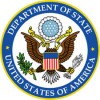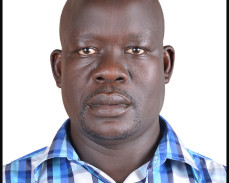 Acaga Taban Ismail has over eight years of experience in the fields of research, surveillance and surveying, and community development, especially the empowerment of disadvantaged groups. Currently, Ismail is a strategic information manager for the CDC-funded Strategic Information project, where he focuses on strengthening strategic information management, surveillance, and surveys. Ismail also volunteers with the South Sudan Union of Persons with Disability and the South Sudan Women Network in generating resource-mobilization funding drives. Ismail holds a bachelor’s degree in Social Science. He is currently pursuing a master’s degree in Project Management at the University of Roehampton, UK, where he is focusing on effective project management to drive high-impact projects for vulnerable communities. Upon completion of the Mandela Washington Fellowship, Ismail plans to continue his work in empowering disadvantaged groups with a focus on advocacy for women’s rights, girl-child education, and equal opportunities for persons living with disabilities.
Acaga Taban Ismail has over eight years of experience in the fields of research, surveillance and surveying, and community development, especially the empowerment of disadvantaged groups. Currently, Ismail is a strategic information manager for the CDC-funded Strategic Information project, where he focuses on strengthening strategic information management, surveillance, and surveys. Ismail also volunteers with the South Sudan Union of Persons with Disability and the South Sudan Women Network in generating resource-mobilization funding drives. Ismail holds a bachelor’s degree in Social Science. He is currently pursuing a master’s degree in Project Management at the University of Roehampton, UK, where he is focusing on effective project management to drive high-impact projects for vulnerable communities. Upon completion of the Mandela Washington Fellowship, Ismail plans to continue his work in empowering disadvantaged groups with a focus on advocacy for women’s rights, girl-child education, and equal opportunities for persons living with disabilities.
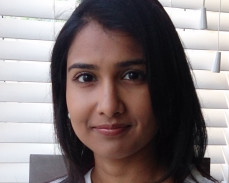
Aneshree Moodley has four years’ experience as a psychiatrist in South Africa’s state health sector. As part of her specialist training, Aneshree completed an MMed, exploring the association between methamphetamine abuse and HIV risk behaviors among the mentally ill. At present, Aneshree is employed as a specialist consultant at Valkenberg Hospital in South Africa, where she has a range of clinical, managerial, lecturing, and research duties. She also does educational outreach activities in her community, and has leadership roles on several committees, including the South African Society of Psychiatrists (SASOP). Aneshree is passionate about women’s mental health and has an interest in HIV, substance abuse, and contraceptive use among women living with mental illness. Upon completion of the Mandela Washington Fellowship, Aneshree plans to continue to advocate for women’s empowerment around contraceptive issues, and hopes to be part of policy development and implementation in this regard.
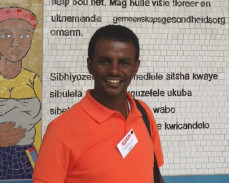
Anteneh Asefa has more than nine years’ experience in the field of public health. Anteneh was a fellow of the Maternal Health Young Champion fellowship of the Maternal Health Task Force at the Harvard School of Public Health, where he mainly focused on promoting respectful childbirth services in Ethiopia. Anteneh has also been part of the Emerging Voices for Global Health Fellowship, in addition to being featured in New Voices in Global Health during the World Health Summit, 2013. Anteneh is currently an assistant professor at Hawassa University, Ethiopia, where he provides academic service, research, and technical support to various organisations. Upon completion of the Mandela Washington Fellowship, he strongly aspires to be one among the committed young leaders who will be shaping the future of African health systems by responding to the health needs of communities, especially women’s and children’s health.
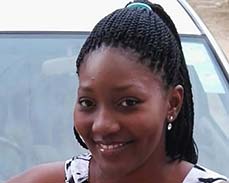
Chilweza Musonda Muzongwe is a planner for the Ministry of Health. She has over five years’ experience in health systems strengthening, social development and international relations and diplomacy. She currently works in bilateral and multilateral development cooperation in the ministry providing strategic planning for health. Through her work, she identifies areas of potential collaboration with cooperating partners, development and analysis of health policies, monitoring and evaluation of partner-funded projects, resource mobilization for the health sector, and coordinating high-level policy dialogue meetings. Chilweza actively volunteers with the Breakthrough Cancer Trust, an association promoting early detection of breast cancer through various awareness campaigns and hospital visitations. Additionally, she co-manages the Hotspurs Basketball Club – mentoring young girls (16-25 years) through sport. Upon completion of the Fellowship, Chilweza hopes to strengthen health systems, mobilize resources to construct a wellness center for cancer patients as well as a basketball court for her team.
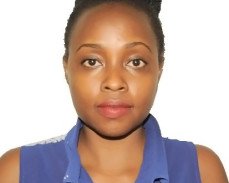
Clarisse Marie Claudine Simbi is a human-rights activist. She holds a master’s degree in Public Health from Mount Kenya University and has over five years’ experience in research. Since 2013, she has worked as statistics officer at the National Commission for the Fight Against Genocide (CNLG), a human-rights and peacebuilding organization. She is responsible for providing high-quality statistical data that helps in the planning and decision-making of the CNLG. Currently, she is conducting an assessment of the living conditions of genocide survivors in the southern province of Kenya. She works closely with the Advocacy unit. The findings from this survey help the needy to access health services, housing, direct financial support, school fees, and legal assistance. Upon completion of the Mandela Washington Fellowship, Clarisse plans to continue fighting genocide ideology and advocating for vulnerable genocide survivors.
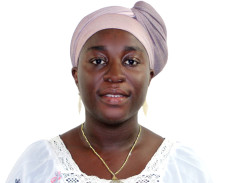
Darlene Y. Garmi has over 12 years of experience in different capacities of the health sector. Currently, she is a project manager for the Maternal Neonatal and Child Health (MNCH) program at Benson Hospital Incorporated, where she focuses on planning, implementing, overseeing, and evaluating project activities. She also has the responsibility of designing innovative community outreach, securing additional partnership and funding from partners, identifying gaps and priority interventions, and then assessing their impacts. She is also a lecturer at a nursing school, contributing to improving nursing education for the transformation of nursing in Liberia. Darlene holds a master’s degree in Nursing Education from the Stella Maris Polytechnic, with a focus on improving and transforming nursing education in Liberia. Upon competition of the Mandela Washington Fellowship, Darlene plans to continue her work in health and education, promoting youth and women’s health educational needs in vulnerable and marginalized communities.
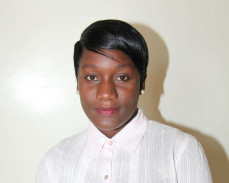
Edna Kabala is an economist with over four years’ experience in the fields of academics and research. She is currently a lecturer of economics at the Copperbelt University, Zambia. She conducts research and consultancy work in various fields of public policy. She contributes to the development of the university and the nation at large by mentoring university students and participating in national developmental research projects. She also volunteers as an associate researcher and journal editor at the Southern African Institute for Policy and Research in Zambia. Edna holds a master’s degree in Economics from the University of Botswana, with a focus on econometrics and research in international and monetary economics. After completing the Mandela Washington Fellowship, Edna plans to expand her research and consultancy work by creating a researchers’ foundation for young people interested in developing Zambia by contributing to evidence-based research.
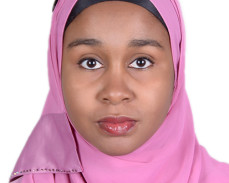
Fatima Mohammed is a medical doctor currently undergoing her residency training in Family Medicine in Aminu Kano Teaching Hospital, Nigeria. She has been practicing medicine for seven years and is especially passionate about issues pertaining to women and children, their health, education, and financial sustenance. In addition to her job, which involves counseling patients in general health promotion, screening for various diseases and cancers, promoting safe reproductive health practices, and helping victims of abuse, Fatima also works with various associations in providing free medical care to internally displaced people and the victims of insurgency. Currently, Fatima is the financial secretary of the association of resident doctors who play a role in influencing the quality and management of health care in teaching hospitals. After completing the Mandela Washington Fellowship, she plans to return to her work, where she will continue advocating for better health care for Nigerians.
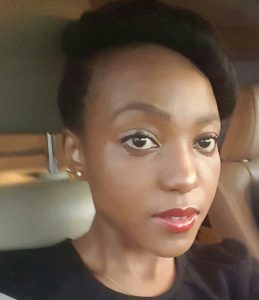
Fernanda Massarongo Chivulele holds an MSc in Development Economics from London University. She works as an economic researcher at the institute of Social and Economic Studies (IESE) in Mozambique. Her work focuses on the relationship between the financial sector, public finances, and the economic structure. She has been at the Institute for over seven years and currently coordinates IESE’s economic and development group. Fernanda also worked as a lecturer in Public Finance, Macroeconomics, and Elementary Economics at the Eduardo Mondlane University, the oldest and biggest university in Mozambique. She was one of the main facilitators in a public budget training program for civil society, organized by IESE and the Civil Society Support Mechanism (MASC). In 2013 Fernanda volunteered to help flood victims in southern Mozambique, and in 2005 she was part of the commission that introduced the ‘prom’ into schools in Niassa, Mozambique’s biggest province.
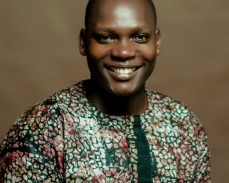
Feyisara Ogunranti has about five years’ experience in food-technology, and is an expert in food safety and formulation. Currently, he works with Standards Organization of Nigeria (SON) as a standards officer, quality-management system (QMS) auditor, and hazard analysis and critical control points (HACCP) expert. He is also involved in training local food handlers in food safety and hygiene. Presently, he is working on development of native African foods as a protein source for war and hunger victims. Feyisara holds a bachelor’s degree in Food Science and Technology from Obafemi Awolowo University. He obtained an HACCP certificate from the International Food Safety and Quality Network and is a trained QMS auditor of Standards Organization of Nigeria. Upon completion of the Mandela Washington Fellowship, Feyisara intends to continue his work in food safety and African-food development. He intends to create a food market where safe foods can be purchased.
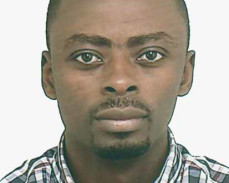
Frank Osei is a research associate at the Kofi Annan International Peacekeeping Training Center, Ghana, and has over six years’ experience in peace and security research and in providing critical policy-relevant analysis on fragility and resilience in Africa. His expertise includes state-building, local governance, and social protection, emphasizing the African Union and ECOWAS region. He volunteers part-time in his local community, mentoring high-school students towards higher education and academic excellence. Frank holds a master’s degree in International Studies and Diplomacy from SOAS, University of London. Upon completion of the Mandela Washington Fellowship, he intends to expand his volunteer service into a community-based organization dedicated to mentoring high-school students and providing free, clean drinking water to basic schools using locally sourced materials. He hopes to contribute to the achievement of the sustainable development goals on quality education, and clean water and sanitation.
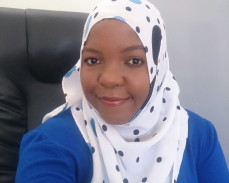
Halima Twabi has over three years of experience in the field of education as a lecturer in Statistics. Currently, Halima is a founding member for Malawi Girls in Science, Technology, Engineering, and Math, where she focuses on promoting STEM-related fields to primary- and secondary-school girls in Malawi. She also mentors young girls in her community on the importance of obtaining an education. Halima holds a master’s degree in Biostatistics from the University of Malawi, Chancellor College, where she focused on applying statistical modeling and research in public health. Upon completion of the Mandela Washington Fellowship, Halima plans to continue her work to equalize the male-to-female ratio of the science sector by encouraging and promoting girls in STEM-related fields through mentorship and tutorship programs. She aims to partner with the National Commission of Science and Technology to build a science resource center in Malawi.
Jean Marie Kabeya has 13 years of experience in diverse domains, having worked as a lawyer, a journalist, and a teacher. Currently, he is a director of Morave University, Ngandajika, where he provides education in Law and in Nursing. In addition, he manages a health clinic that he launched in the remote area of Kaseki, 23 kilometers from Ngandajika, to give villagers access to health care. Jean Marie graduated in Public Law from the University of Lubumbashi in DRC, with a focus on Law and International Relations. He has proficiency in five languages – English, French, Tshiluba, Lingala, and Swahili – and he is interested in engaging in debate and respecting the opinions of the others. He plans to keep on promoting education, peaceful conflict resolution, military justice establishment in Ngandajika, and work in the struggle against under-aged marriage for girls.
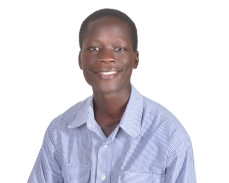
Job Lakal holds a degree in Economics from Makerere University. He has a bias in research, monitoring, and evaluation. Job has spent the last three and a half years working as a monitoring and evaluation (M&E) officer designing and building monitoring and evaluation systems for governance projects in Northern Uganda. He has considerable experience in the design of M&E systems for learning and accountability, participatory monitoring, and evaluation, research, data analysis, and presentation. He is also proficient at motivational speaking and speech writing. Job initially worked for Lira NGO Forum, but is now taking on a new role in a similar position at the National Association of Women’s Organization in Uganda (NAWOU). After the Mandela Washington Fellowship, Job plans to focus on building a national M&E system for NAWOU, which will support evidence-based policy research and advocacy, and attract development programs for young Ugandan girls and women.
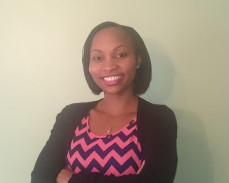
Julliet Wanjiku Gichuru is a medical doctor with over five years’ experience in health care in the public sector and nongovernmental organizations, including over 14 months with the International Rescue Committee at the UNHCR Kakuma Refugee Camp in Northern Kenya. While there, she gained experience in supervising community-health initiatives, epidemiological data collection, disease-outbreak surveillance, and health-systems management. Wanjiku later pursued a master’s in International Health and Applied Epidemiology from the University of Nottingham, UK, with a focus on effective epidemiological research in noncommunicable diseases. She currently works with the Ministry of Health. Upon completion of the Mandela Washington Fellowship, Wanjiku plans to work with clinicians and other stakeholders in generating local epidemiological cancer research. The aim is to provide evidence-based initiatives that are sustainable, appropriate, and accessible to each and every Kenyan, mirroring the current success of HIV and tuberculosis programs.
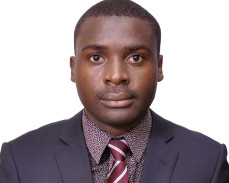 Nehemiah B Fensuah is a Liberian economist with six years’ experience in the public financial management sector of Liberia. He is currently an economist at Liberia’s Ministry of Finance and Development Planning, where his responsibilities are to provide technical support to the assistant minister for economic policy on issues relating to economic research, macroeconomic, and financial-sector policies. He also volunteers with Messengers of Peace Liberia, a youth group that works closely with young people to spread messages of peace and non-violence in post-war Liberia. Nehemiah holds a Master of Science degree with honors in Political Economy of Development (Economics) from SOAS, University of London. He also participated in ‘Learn to Lead’, the University of Westminster and International Students House (London) course in multicultural leadership. Upon completion of the Mandela Washington Fellowship, Nehemiah looks forward to supporting the Liberian government through research to inform pro-poor policies and poverty-reduction programs.
Nehemiah B Fensuah is a Liberian economist with six years’ experience in the public financial management sector of Liberia. He is currently an economist at Liberia’s Ministry of Finance and Development Planning, where his responsibilities are to provide technical support to the assistant minister for economic policy on issues relating to economic research, macroeconomic, and financial-sector policies. He also volunteers with Messengers of Peace Liberia, a youth group that works closely with young people to spread messages of peace and non-violence in post-war Liberia. Nehemiah holds a Master of Science degree with honors in Political Economy of Development (Economics) from SOAS, University of London. He also participated in ‘Learn to Lead’, the University of Westminster and International Students House (London) course in multicultural leadership. Upon completion of the Mandela Washington Fellowship, Nehemiah looks forward to supporting the Liberian government through research to inform pro-poor policies and poverty-reduction programs.
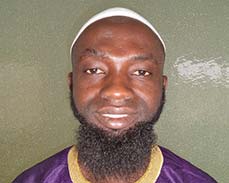
Nfamara is a public health professional with over 10 years’ experience with the Ministry of Health. He recently joined Sightsavers The Gambia Guinea-Bissau country offices as programs officer for neglected tropical diseases (NTDs). In this role he supports the Ministry of Health of Guinea-Bissau to plan, implement, monitor and evaluate public health interventions directed at the elimination of neglected tropical diseases like trachoma and onchocerciasis. Nfamara graduated from the University of The Gambia with a bachelor’s degree in Public and Environmental Health. He holds a certificate in Public Health Management from the West African Health Organization (WAHO), and is an alumnus of WAHO and the YALI Regional Leadership Training Center in Ghana. After the Fellowship, Nfamara intends to continue working in his current role to broaden his public health experience. He is also interested in mentoring and coaching school children and improving the lives of older persons in The Gambia.
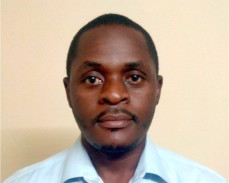
Pascal Anengbah has over four years of international development experience in the fields of health and nutrition program management, community engagement, capacity building, and promoting girls’ education through a school-feeding program. Currently, Pascal is the program manager in food aid for improving nutrition in Cameroon at Counterpart International, where he plays a frontline role in curbing malnutrition, especially in children under five. He also volunteers in his community to educate youths on civic responsibilities through club activities in secondary schools. Pascal holds a masters’ degree in Applied Nutrition from the National School of Agro-Industrial Sciences at the University of Ngaoundere, a BSc in Microbiology and Parasitology from the University of Buea, Cameroon, and a diploma in Global Health studies. Upon completion of the Mandela Washington Fellowship, Pascal plans to continue his work towards a hunger-free, food-sufficient Cameroon through the proper organizational management of food systems.
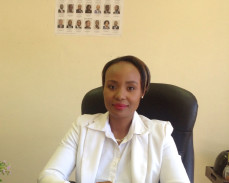
Pulane Mphatsoe Tsenoli has 11 years of experience in the field of clinical psychology, public health, and health research. She is currently employed as a clinical psychologist by the Ministry of Health at Mohlomi Psychiatric Hospital, where she provides psychotherapeutic and community outreach services in various districts of Lesotho. She also conducts health research and policy development for the Mental Health Program in the Ministry of Health. Pulane holds two master’s degrees; one in Public Health, in which she conducted a patient satisfaction survey on the quality of care at Mohlomi Psychiatric Hospital and another in Clinical Psychology, where she explored young South Africans’ sense of identity and self. Upon completion of the Mandela Washington Fellowship, she plans to focus on establishing a psychology council in Lesotho, which she hopes will contribute significantly towards the regulation of the psychology profession and practice in Lesotho.
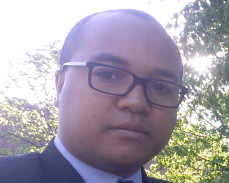
Rado Razafindrakoto has over eight years’ experience in the financial inclusion sector, including banking, microfinance, insurance, mobile financial services, and financial literacy. Rado is currently in charge of monitoring and evaluation at the Direction of Financial Operations, more precisely in the National Coordination of Inclusive Finance, in the Ministry of Finances/Treasury Department. He graduated in Public Management from Madagascar National School of Administration and holds his master’s degree in Economics from the University of Antananarivo. Rado has already participated in various international executive training programs in the field of financial inclusion, such as the Rethinking Financial Inclusion program organised by Harvard Kennedy School of Executive Education in Cambridge, USA in 2015. Rado plans to continue his work in promoting financial inclusion in Madagascar with a focus on financial literacy. He also plans to share his new skills to all colleagues at the Ministry of Finances.
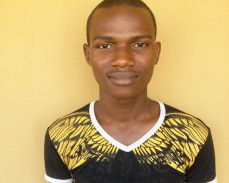
Sulaiman Jalloh has over two years’ working experience in the provision of psychosocial support, mentoring disadvantaged children and youth, and engaging in research and evaluation activities. He recently graduated with the first cohort of Social Work students in Fourah Bay College, and currently works as the monitoring and evaluation officer and assistant project manager for IsraAID Sierra Leone. He also provides mentorship and tutorial opportunities to ten senior secondary-school youths in the community, and does weekly consultations with final-year social work students writing their theses. Sulaiman holds a bachelor’s degree in Social Work from Fourah Bay College, the University of Sierra Leone, and his area of interest is social work with children and their families. After completing the Mandela Washington Fellowship, Sulaiman hopes to widen his impact in his community and organization with a special focus on youth engagement and the protection of children from cruelty and abuse.
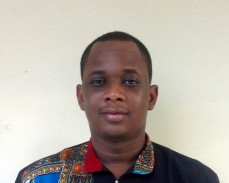
Thierry Guigma has been working in the health sector for more than five years and he is currently doing research on a vaccine against Ebola as an investigator in a clinical trial at Center Muraz Institute. Thierry is a founding member and a coordinator for the National Association against Malaria in the West Region of Burkina Faso, where he focuses on developing strategies for malaria prevention. He also volunteers in his community by providing free health assistance during national events to people in need. Thierry holds a doctorate in Medicine from the National Institute of Health Science of Bobo Dioulasso and a master’s degree in Public Health from Aix-Marseille University in France, where he focused on biostatistics and applied econometrics. After the completion of the Fellowship, Thierry plans to contribute to the strengthening of the health system in Burkina Faso by implementing a new approach to planning and resource management.
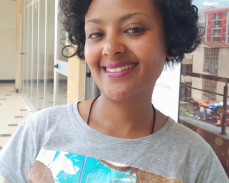
Tirsit Retta has over 10 years of experience in leadership and public mobilization in the community, and academia and charity organizations. She engages herself in humanitarian services through the Red Cross, Family Guidance Association and Missionaries of Charity to deliver medical services and health education to the poor and destitute. In academia she plans, organizes, directs, and monitors medical professionals who deliver health services to the public. Her unwavering interest in research led her to initiate the largest epidemiological study in Ethiopia, which examines 500,000 patient records to determine skin disease trajectories. Tirsit earned her medical doctorate degree from Jimma University and her postgraduate specialty certificate from Addis Ababa University. Her plan after attending the Mandela Washington Fellowship is to establish an evidence synthesis center in Ethiopia to produce high-quality research, and then inspire women and physicians in the areas of science, environment, and education.
Tukur Garba Gada is a medical doctor in Sokoto State, Nigeria. He is currently involved in championing the reduction of child and maternal mortality, as well as advocating for girl-child education. He has over seven years’ experience in patient care, particularly emergency obstetrics care and malnutrition at governmental and nongovernmental organizations. Tukur holds an MBBS degree from Ahmadu Bello University Zaria Nigeria (2009). Upon completion of the Mandela Washington Fellowship, Tukur plans to scale up his activities, particularly in the rural areas, catering for the most vulnerable.
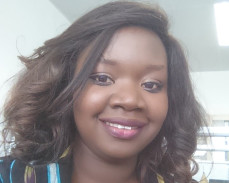
Yaye Ramatoulaye Dieye has over ten years of experience in results-based management in international organizations, the United Nations in particular. Currently working with the African Union Commission on gender policy, Rama focuses on initiating, designing and implementing programs and policies with the aim of empowering women and reducing the gender gap. Born in Dakar, raised in the Gambia and resident of Ethiopia, Rama strongly believes that women from all over the continent have a critical role to play in implementing Agenda 2063 for the Africa we want, but that requires building their capacities and ensuring their access to rights. With a degree in Statistics, Rama holds a master’s degree in Development Studies and Project Management and has strong planning and analytical skills. Upon completion of the Mandela Washington Fellowship, Rama plans to continue her work in empowering women with a focus on young females.


